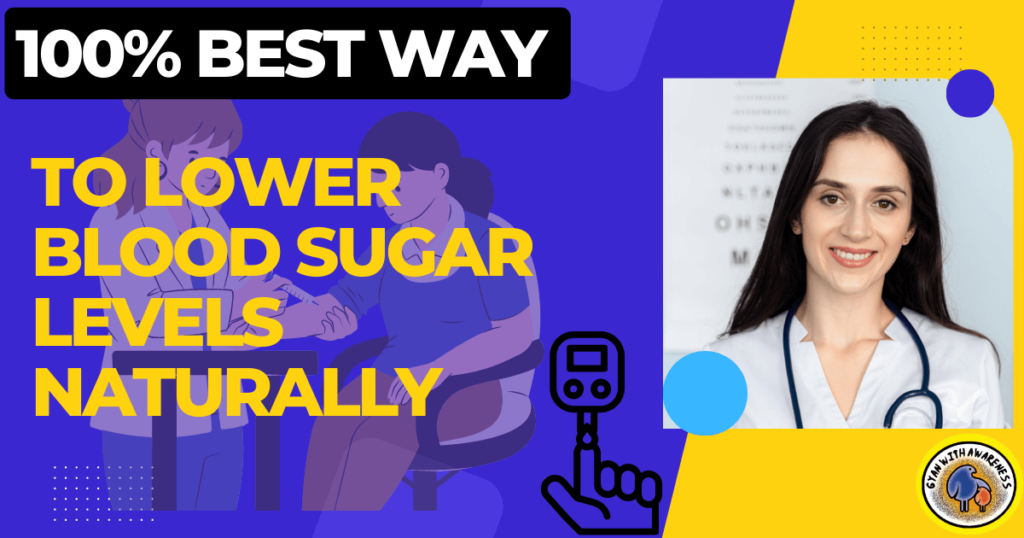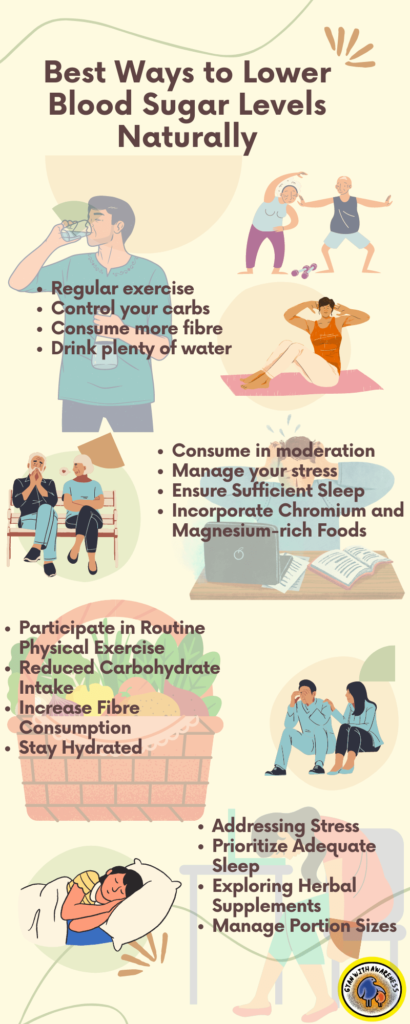Manage or Lower blood sugar levels is critical for diabetics to maintain optimal health and avoid complications. While medication and insulin therapy are necessary for many people, there are also effective natural blood sugar-lowering strategies. These methods emphasise changing one’s lifestyle and incorporating healthy habits into one’s daily routine.
In this guide, we will look at the best natural ways for diabetics to lower blood sugar levels of them. These approaches, which range from dietary changes to physical activity and stress management, can all play an important role in achieving and maintaining stable or lower blood sugar levels.
By making informed choices about what we eat and how we live, we can positively impact blood sugar control and overall well-being. It is important to note that these natural strategies should be implemented in consultation with a healthcare professional to ensure they align with individual health needs and any existing treatment plans.
Through the integration of these natural approaches, individuals with diabetes can enhance their self-care, improve blood sugar management, and potentially reduce their reliance on medication. However, it is crucial to maintain regular communication with healthcare providers, monitor blood sugar levels, and adjust treatment plans accordingly.
Empowering individuals with knowledge and practical tools, this guide aims to support those living with diabetes in their journey towards better blood sugar control and improved quality of life. Let’s explore the best ways to lower blood sugar levels naturally and take charge of our health.
Symptoms of Lower Blood Sugar Levels:
Recognizing the symptoms of lower blood sugar levels, also known as hypoglycemia, is crucial for timely intervention. These signs can vary from person to person but commonly include physical and cognitive changes that signal the need for prompt action to prevent complications and ensure overall well-being.
Shakiness or Tremors: Sudden shaking or trembling, particularly in the hands, can indicate low blood sugar.
Sweating: Experiencing excessive sweating, even when the environment is not warm, might be a sign of low blood sugar.
Rapid Heartbeat: A fast heart rate or palpitations can be a response to decreased blood sugar levels.
Hunger: Intense feelings of hunger, often accompanied by cravings for sugary foods, can be a symptom of low blood sugar.
Dizziness or Lightheadedness: Feeling dizzy or lightheaded, sometimes leading to a sense of unsteadiness, may signal low blood sugar.
Irritability or Mood Changes: Sudden mood swings, irritability, or anxiety might occur with low blood sugar.
Weakness or Fatigue: Feeling unusually weak or fatigued, not explained by other factors, could be related to low blood sugar.
Difficulty Concentrating: Problems with focus, memory, and concentration might arise when blood sugar levels drop.
Blurred Vision: Vision problems, such as blurred vision, can occur temporarily due to low blood sugar.
Headache: A persistent headache or head discomfort may be indicative of low blood sugar levels.
It’s important to note that these symptoms can vary from person to person, and experiencing one or more of these signs doesn’t necessarily confirm low blood sugar levels. If you suspect low blood sugar, it’s advisable to check your levels using a glucose meter and take appropriate actions based on your healthcare provider’s recommendations.
Read More: Rosemary : Victory on Diabetes with 10 Remedies- Part 1
The Best Medicinal Plants Chart: 10 Medicinal Plants in India
Best Ways to Lower Blood Sugar Levels Naturally:
Properly managing blood sugar levels is essential for overall health, particularly for individuals dealing with diabetes or striving to uphold stable glucose levels. Embracing natural approaches fosters well-being by incorporating lifestyle modifications encompassing diet, physical activity, stress handling, and more.
Regular exercise:
Physical activity lower blood sugar levels by increasing insulin sensitivity and facilitating glucose uptake by muscles.
Control your carbs:
Take note of the type and quantity of carbohydrates you consume. To avoid blood sugar spikes, choose complex carbs with a lower glycemic index and limit portion sizes. In the lower blood sugar levels condition carbohydrates plays an important role.
Consume more fibre:
High-fiber foods, such as whole grains, legumes, fruits, and vegetables, can aid in blood sugar regulation by slowing digestion and sugar absorption. These food items helps in lower blood sugar levels.
Drink plenty of water:
Staying hydrated helps to maintain proper kidney function, which aids in the removal of excess glucose from the bloodstream.
Consume in moderation:
Avoid overeating because large meals can cause insulin levels to spike. To keep your glucose levels in the blood stable, eat smaller, more balanced meals throughout the day. Eating balanced food manage lower blood sugar levels.
Manage your stress:
prolonged anxiety can cause glucose levels to rise. To help reduce tension, use stress-reduction techniques such as meditation, deep breathing exercises, or engaging in activities that you enjoy. Best way to cure lower blood sugar levels.
Ensure Sufficient Sleep:
Insufficient sleep can hinder the production of insulin, potentially contributing to obesity and diabetes. and lower blood sugar levels. Strive for a consistent 7-9 hours of uninterrupted sleep each night.
Incorporate Chromium and Magnesium-rich Foods:
Including foods rich in chromium and magnesium in your diet can be beneficial. Chromium promotes improved insulin sensitivity, while magnesium supports the metabolism of glucose. And also help in managing lower blood sugar levels.
Participate in Routine Physical Exercise:
Establishing a regular pattern of physical activity is crucial for regulating glucose levels. It boosts the body’s responsiveness to insulin and enables muscles to effectively use insulin for energy. Strive for a minimum of 150 minutes per week dedicated to moderate-intensity aerobic workouts and strength training. helps in lower blood sugar levels.
Reduced Carbohydrate Intake:
Control your carb consumption, especially refined sugars and processed edibles that lead to rapid spikes in blood sugar. Opt for whole, unprocessed foods that are lower in carbs, such as non-starchy vegetables, lean proteins, and beneficial fats. Prioritize high-fiber foods that have minimal impact on blood sugar levels. Lower blood sugar levels is good for diabetic person.
Increase Fibre Consumption:
Fiber-rich foods like fruits, vegetables, legumes, and whole grains slow glucose absorption and help regulate blood sugar levels. Make an effort to consume at least 25-30 grammes of fibre per day. To increase fibre intake, include sources such as chia seeds, flaxseeds, and psyllium husk.
Stay Hydrated:
Consume ample water to help eliminate surplus sugar from the bloodstream and maintain proper hydration. Aim for a minimum of 8 cups (64 ounces) of water daily. Steer clear of sugary beverages, as they can trigger abrupt rises in blood sugar levels.
Addressing Stress:
Prolonged stress can elevate blood sugar levels. Participate in stress-reducing practices like meditation, deep breathing routines, yoga, or engaging in enjoyable hobbies. Prioritize self-care and achieve a harmonious equilibrium between work and personal life.
Prioritize Adequate Sleep:
Not getting enough sleep diminishes insulin responsiveness and may result in heightened blood sugar levels. Strive for 7-8 hours of restful sleep each night. Foster a sleep-conducive setting, establish a pre-sleep routine, and steer clear of stimulating activities before bedtime.
Exploring Herbal Supplements:
Certain herbal supplements exhibit potential in lowering blood sugar levels. Cinnamon, fenugreek, berberine, and bitter melon stand as notable examples. However, before integrating any supplements into your regimen, it’s crucial to consult a healthcare expert, as these supplements could interact with medications.
Manage Portion Sizes:
Pay attention to the sizes of your servings to prevent excessive carbohydrate intake. Utilize smaller dishes, practice portion management, and emphasize well-rounded meals encompassing protein, beneficial fats, and whole-food carbohydrates.
SUMMARY:
A range of natural methods exists to decrease blood sugar levels for individuals managing diabetes or aiming to uphold balanced glucose levels. By integrating these approaches into your daily habits, you can proficiently oversee blood sugar and mitigate potential complications linked to elevated levels.
Consistent engagement in physical activity enhances both insulin sensitivity and the effectiveness of glucose utilization by muscles. The synergy of aerobic exercises and strength training aids in the management of blood sugar. Additionally, adopting a reduced-carbohydrate diet and elevating fiber intake contributes to the stabilization of blood sugar surges and facilitates enhanced glycemic control.
Maintaining hydration, handling stress levels, and obtaining adequate sleep also stand as pivotal elements in sustaining optimal blood sugar levels. Effective hydration supports the elimination of surplus sugar, while stress management methods and sufficient sleep contribute to elevated insulin sensitivity.
Specific herbal supplements, like cinnamon, fenugreek, and bitter melon, exhibit encouraging potential in regulating blood sugar. Nevertheless, seeking advice from a healthcare professional prior to introducing any supplements into your routine is essential.
Regulating blood sugar levels necessitates practicing portion control and mindful eating. A grasp of suitable portion sizes and making balanced meal selections enables the avoidance of excessive carbohydrate consumption, fostering consistent blood sugar levels.
It’s imperative to recognize that these natural solutions do not serve as substitutes for medical guidance or prescribed medications. Collaborating closely with your healthcare team to monitor blood sugar levels and enact any required adjustments to your treatment regimen remains crucial.
Through the integration of these natural strategies into your everyday routine, the reduction of blood sugar levels and enhancement of overall well-being become attainable. The blend of consistency and an individualized approach to diabetes management lays the foundation for sustained success in upholding healthy blood sugar levels over the long term.
Read More: 12 Exercises for Diabetes: Best Plan to Manage Your Health Part -1
12 Diabetes Exercises for a Vibrant Life: Fit and Fearless Part -2
Dangerous Complications: Decoding 8 Health Risks Linked to Diabetes
FAQ:
How can I lower blood sugar levels quickly?
To swiftly lower blood sugar levels, prioritize hydration, engage in light exercise, and consume fiber-rich foods like vegetables and whole grains. Incorporate cinnamon, apple cider vinegar, and protein into meals, while practicing portion control. Employ stress-reduction techniques and consider green tea. Adhere to prescribed medications and consult a healthcare professional for a comprehensive approach.
What foods will lower blood sugar levels quickly?
Foods that can rapidly lower blood sugar levels include high-fiber options like vegetables, whole grains, and legumes, which slow glucose absorption. Cinnamon may help enhance insulin sensitivity. Protein-rich foods, such as lean meats and tofu, slow carbohydrate digestion. Additionally, consuming small amounts of apple cider vinegar or drinking unsweetened green tea might offer slight benefits. It’s vital to combine these foods with a balanced diet, proper hydration, and regular physical activity for effective blood sugar management.



1 thought on “100% Best Way to Lower Blood Sugar Levels Naturally”